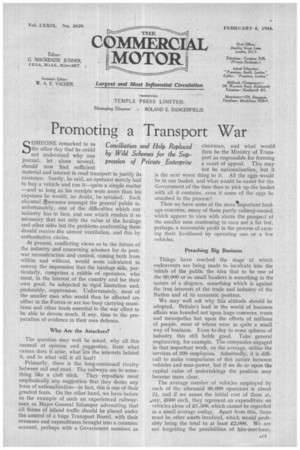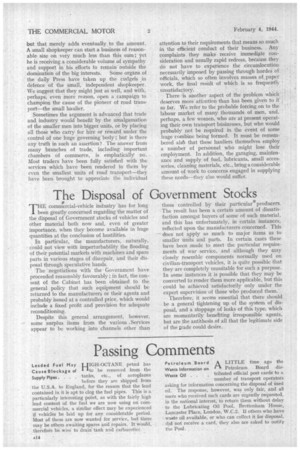Promoting a Transport War
Page 15

Page 16

If you've noticed an error in this article please click here to report it so we can fix it.
SOMEONE remarked to us the other day that he coUld not understand why one journal, let alone several, should now find sufficient material and interest in road transport to justify its existence. Surely, he said, an operator merely had to buy a vehicle and run it—quite a simple matter ----and so long as his receipts were more than his expenses he would, no doubt, be satisfied. Such abysmal itnoranceamongst the general public is, unfortunately, one of the difficulties which our industry has to face, and one which renders it so necessary that not only the value of the haulage and other sides but the problems confronting them should receive the utmost ventilation, and this by authoritative circles.
At present, conflicting views as to the future of the industry and concerning schemes for its postwar reconstruction and control, coming both from within and without, would seem calculated to convey the impression that the haulage side, particularly, comprises a rabble of operators, who must, in the interest of the country and for their own good, be subjected to rigid limitation and, preferably, suppression. Unfortunately, most of the smaller men who would thus be affected are either in the Forces or are too busy carrying munitions and other loads essential to the war effort to be able to devote much, if any, time to the preparation of evidence in their own defence.
Who Are the Attackers?
The question may well be asked, why all this turmoil of opinion and suggestion, from what causes does it arise, what're the interests behind it, and to what will it all lead?
Primarily, there is the long-continued rivalry between rail and road. The railways are in something like a cleft stick. They repudiate most emphatically any suggestion that they desire any form of nationalization—in fact, this is one of their greatest fears. On the other hand, we have before us the example of such an experienced railwayman as Major-General Szlumper advocating that all forms of inland traffic should be placed under the. control of a huge Transport Board, with their revenues and expenditures brought into a common account, perhaps with a Government nominee as chairman, and what would then be the Ministry of Transport as responsible for forming a court of appeal. This may not be nationalization, but it is the next worst thing to it. All the eggs would be in one basket, and what would be easier for the Government of the time than to pick up the basket with all it contains, even if • some Of the eggs be smashed in the process? Then we have some of the moreltmportant haulage concerns, many of them partly railway-owned, which appear to view with alarm the prospect of the smaller men continuing to earn not a fat but, perhaps, a reasonable profit in the process of earning their livelihood by operating one or a few vehicles.
Preaching Big Business Things have reached the stage at which endeavours are being made to inculcate into the minds of the public the idea that to be one of the 60,000 or so small hauliers is something in the nature of a disgrace, something which is against the true interests of the trade and industry of the Nation and of its economic position.
We may well ask why this attitude should be adopted. Britain's lead in the world of business affairs was founded not upon huge concerns, trusts and monopolies but upon the efforts of millions of people, most of whom were in quite a small way of business. Even to-day in some spheres of industry this still holds good. Take general engineering, for example. The companies engaged in that important work, on the average, utilize the services of 200 employees. Admittedly, it is difficult to make comparisons of this nature between vehicles and man-power, but if we do so upon the capital value of undertakings the position may become more clear.
The average number of vehicles employed by each of the aforesaid 60,000 operators is about 2i, and if we assess the initial cost of these at, £600 each, they represent an expenditure on vehicles alone of £1,500, which cannot be regarded as a small average outlay. Apart from this, there must be other assets involved, which would prob-, ably bring the total to at least £2,000. We are not forgetting the possibilities of hire-nurchase, but that merely adds eventually to the amount. A small shopkeeper can start a business of reasonable size on very much less than this sum ; yet he is receiving a considerable volume of sympathy and support in his efforts to remain outside the domination of the big interests. Some organs of the daily Press have taken up the cudgels in defence of the small, independent shopkeeper. We suggest that they might just as well, and with, perhaps, even more reason, open a campaign to champion the cause of the pioneer of road transport—the small haulier.
Sometimes the argument is advanced that trade and industry would benefit by the amalgamation of the smaller men into bigger units, or by placing all those who carry for hire or reward under the control of one huge governing body ; but is there any truth in such an assertion? The answer from many branches of trade, including important chambers of commerce, is emphatically no. Most traders have been fully satisfied with the services which have been rendered to them by even the smallest units of road transport—they have been brought to appreciate the individual attention to their requirements that means so much in the efficient conduct of their business. Any complaints they make receive immediMe consideration and usually rapid redress, because they do not have to experience the circumlocution necessarily imposed by passing through hordes of officials, which so often involves masses of paper work, the final result of which is so frequently Unsatisfactory, There is another aspect of the problem which deserves more attention than has been given to it so far. We refer to the probable forcing on to the labour market of many thousands of men, and, perhaps, a few women, who are at present operating their own transport businesses, but who would probably not be required in the event of some huge combine being formed, it must be remembered alsb that these hauliers themselves employ a number of personnel who might lose their employment. In addition, the garaging, maintenance and supply of fuel, lubricants, small accessories, cleaning materials, etc., bring a considerable amount of work to concerns engaged in supplying these needs—they also would suffer.




















































